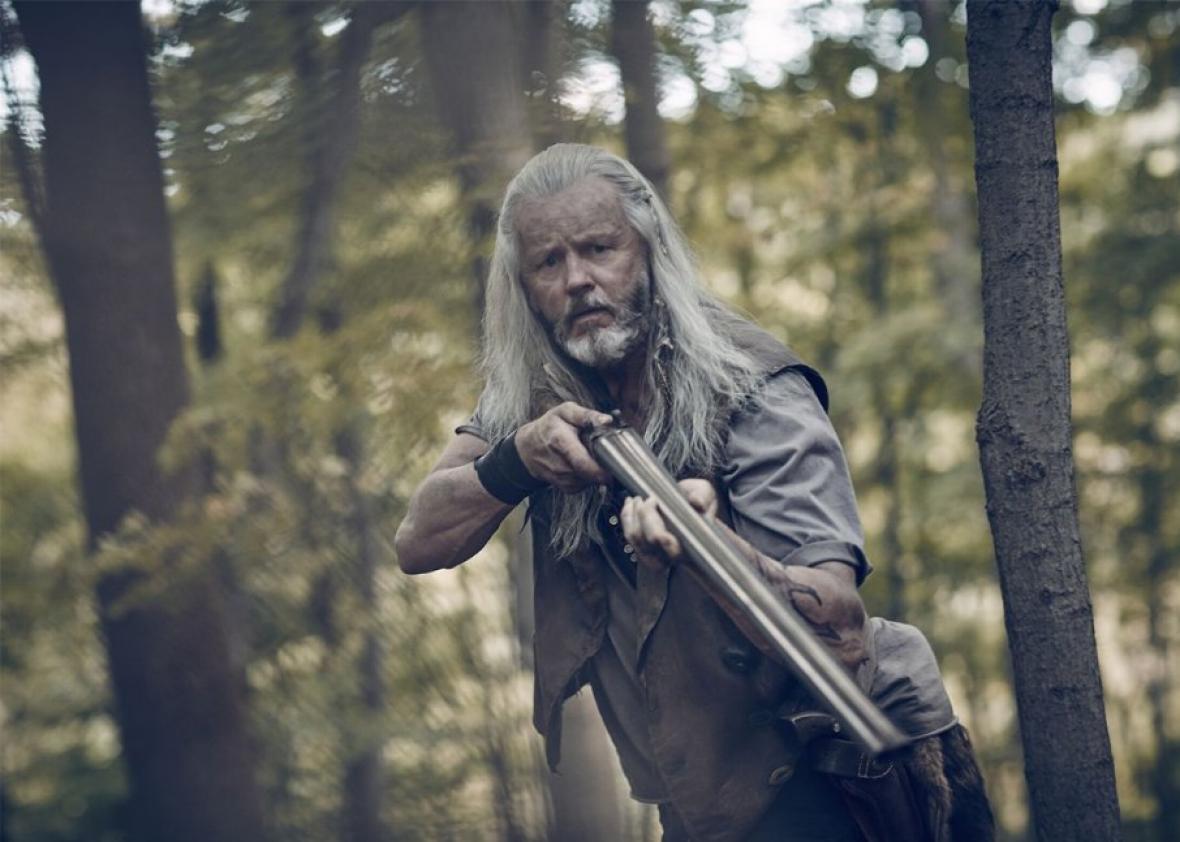What’s a TV critic’s worst nightmare? A hard-drive failure deleting the cache of old shows lovingly preserved on her DVR? The thought that IMDB might go out of business just as her last brain cell capable of remembering what the hell that actor was in flickers and dies? Mine is the cognitive dissonance that emerges from being repulsed by some parts of a show and absolutely enchanted by others; being left cold by what’s on screen but excited by its potential.
That’s how I feel about Outsiders, the new WGN America series that debuted last Tuesday. It’s set in Blackburg, an Appalachian community that’s divided between the regular citizens, who live and work—or mostly don’t, in the current economy—in town, and the Farrell clan, who’ve maintained a separate existence atop the local mountain for 200 years. The Farrells are hard-core isolationists: They don’t register births, deaths, and marriages; go to school; or have any use for money. They follow customs brought from the old country—an unspecified, vaguely Celtic, European land—and obey the directives of the bren’in, their leader.
At the start of the season, the clan is at a crossroads: Lady Ray (Phyllis Somerville), the longtime bren’in, is nearing the end of her reign—at least as far as her son and heir Big Foster (David Morse), the Prince Charles of Appalachia, is concerned. Big Foster’s patience is running out, though judging from the impulsive choices he makes in the first episode, his long apprenticeship still hasn’t prepared him for power. The Farrells’ way of life is also threatened from without: Coal company officials want to evict them—the clan doesn’t have title to the land—so they can get to mining and, they claim, bring jobs to the depressed town. The coal company executives are the show’s true outsiders and a loathsome Big Bad—soon after parachuting in, they wield an outsize influence over local officials and resort to dirty tricks to manipulate Deputy Sheriff Wade Houghton (the always fabulous Thomas M. Wright), an addict and single dad who appears to have reasons of his own for wanting to leave the Farrells the hell alone.
It’s easy to list shows that share common elements with Outsiders, and several critics have done so. Papers from New York to Los Angeles have compared it—not necessarily favorably, but such company!—with The Sopranos, Sons of Anarchy, Justified, and Game of Thrones. It’s hard to deny the similarities. Like the first two, Outsiders is about an asymmetric battle between a family that lives by a code, and the combined forces of capitalism and the criminal justice system. Like Justified, it has moonshine in its DNA; and like Game of Thrones, it’s packed with pageantry, prophecy, and scruffy facial hair.
There are also oodles of totally gross, utterly shocking violence. Judging from the five episodes I’ve seen, Outsiders’ producers are determined to squeeze at least one high-impact fight scene (Episode 2’s involved two Farrells jousting on all-terrain vehicles) and as many stomach-churning acts of carnage as possible into every hour. (In the pilot alone, Big Foster punishes a disobedient member of the clan by amputating two fingers with an ax, and a moonshine-addled teenager sticks a kitchen knife in his father’s neck.). I’m sure that’s an effective way to draw thrill-seeking viewers to a new show, but I can’t be the only person turned off by all that gore.
And if it weren’t for the talky bits in between all that bloodshed, I’d happily write Outsiders off as one of the many fine shows that are just too violent for my delicate disposition. The acting is universally great; there’s a charming and sexy Romeo and Juliet romance; and if the love triangle between Farrell, who has just returned to the mountain after years away from the clan, the woman he left behind, and the big lug she settled for wasn’t so epically unbalanced, it might be quite compelling. But while there’s nothing particularly fresh about the characters and plotlines in Outsiders, the Farrells’ society is genuinely fascinating. No technology, no books—they don’t need them, since they never learn to read—and no money. How can they possibly stand up to the rapacious coal company, especially without the support of the townies, who see the Farrells—not without reason—as thieving, trespassing, nuisances?
At the Television Critics Association gathering last month, the show’s creator, playwright Peter Mattei, told me that the idea for the show came to him as he was contemplating structural inequality in America. Mattei, who was born in Ferguson, Missouri, started with nerdy notions about the David-and-Goliath mismatch between the militarized establishment and marginalized communities, and fantasies about a showdown between the free market and a society, like the Farrells’, that’s based on a gift economy. Every time there’s a pause in the fighting, moonshine swigging, and succession plotting, those ideas peep through, and they bewitch me the way “Farrell wine,” the clan’s signature hooch, spellbinds the folks that drink it. I know that I’m wishing Outsiders were less like a TV show and more like a senior seminar, but I did warn you that this is my nightmare.
